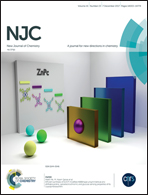Effect of Ru/Cl ratio on the reaction of acetylene hydrochlorination†
Abstract
A series of catalysts with different ruthenium and chloride ratios were prepared and evaluated in the acetylene hydrochlorination reaction, in combination with several characterization techniques. The results indicate that the catalyst with the optimum ratio of Ru/Cl = 5/7 exhibits the highest initial acetylene conversion above 96.1% at 180 °C, an GHSV(C2H2) of 180 h−1, and a feed ratio VHCl/VC2H2 of 1.15. Appropriate coordination numbers of ruthenium and chloride could increase the amount of ruthenium oxides, improve the dispersion of Ru species on the carrier and enhance the adsorption ability of the catalyst, consequently improving the catalytic performance. TPPB additives can further enhance the activity and stability of the catalyst, which also provides a promising strategy to explore highly efficient and economic mercury-free catalysts for the hydrochlorination of acetylene.



 Please wait while we load your content...
Please wait while we load your content...